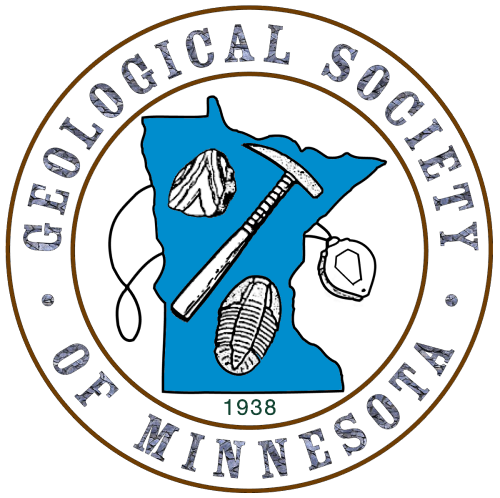Current Year Schedule
GSM seminars with slide show presentations are free and open to the public. They are presented by leading professionals in their fields and are aimed at learners from high school to adult. A question-and-answer session follows each seminar. The labs, also free and open to the public, allow a hands-on learning experience and demonstrate the ideas and principles of geology and earth science. Live lectures and labs require no registration; just show up a few minutes early on the evening of the lecture.
Click on date of any seminar for attendance information and other details. For a printable version of our schedule of seminars and labs, click here.
Except as noted, live lectures during fall 2024 are Mondays at 7:00 PM CT on the University of Minnesota campus, Keller Hall, Room 3-230. The address is 200 Union St. SE, Minneapolis MN. A lecture with (V) following its title is an online virtual lecture. For these, free registration is required by non-members; the instructions are supplied with the lecture description.
Our schedule is planned over 6 months in advance, so changes may occur. Always check this website shortly before each lecture for the latest seminar information.
Winter weather will come and snow might impact our lectures. The GSM will make any decision about cancelling or postponing a lecture due to inclement weather no later than 3:00 PM the day of the lecture. This information will be posted on the GSM home page (http://www.gsmn.org/). So check our home page shortly before each lecture in case there is a cancellation or a last-minute change. Also, we will e‐mail lecture postponement and cancellation information to our members.
Past seminars marked with * were recorded and the recording is available on the Geological Society of Minnesota YouTube channel. Subscribe to this channel for updates.
Seminar Details
Seminar Lab Date: November 25, 2024
Seminar Lab Subject: SHALE IN A NUTSHELL: AN OVERVIEW OF SHALE OIL AND GAS IN THE U.S. AND TEX-AS (V)
Seminar Lab Presenter: TIM MCMAHON, PH.D., PROJECT MANAGER & PRINCIPAL INVESTIGATOR FOR TIGHT OIL RESOURCE ASSESSMENT (TORA) CONSORTIUM
Seminar Lab Location:
Virtual lecture 7:00 PM CT.
Participation instructions will be e-mailed to GSM members. If you are not a member of GSM and wish to attend this free seminar online, register as follows by 12 noon CT Monday, Nov 25: Go to the Contact menu above and select “Ask GSM”. In the form that appears, enter your name and e-mail address. Enter “Nov 25 lecture” in the subject line. In the message body, please enter the city and state or country from which you will view the seminar. You will receive instructions by e-mail prior to the lecture. Check your spam folder if the instructions do not appear in your in-box at least one hour prior to the lecture.
Seminar Lab Detail:
Summary: Over the last 20 years, oil and gas production from shale reservoirs has grown from a small fraction to more than half of total U.S. hydrocarbon production. This presentation is an attempt to give a high-level overview of the development and current state of shale oil and gas in the United States and Texas. A brief history of hydrocarbon production from shale in the U.S. is given, which shows that the “shale revolution” was the product of more than two decades of experimentation and technology development, rather than an overnight success. A review of the basin development and geologic characteristics of major shale plays highlights that many of these “different” reservoirs were deposited in similar conditions and are sometimes stratigraphically equivalent. We end with a discussion of shale resource base and production trends.
Biography: Tim McMahon is the Project Manager for the Tight Oil Resource Assessment (TORA) consortium at the Bureau of Economic Geology. Prior to joining the BEG in July 2022, Tim spent more than 25 years as a geologist in the oil and gas industry, including 10 years with ConocoPhillips, mostly as an exploration geoscientist. He has worked on projects around the world, and lived in Canada, Norway, and Malaysia. After leaving ConocoPhillips, he founded Cutlass Exploration where he participated in onshore US exploration wells and provided geoscience consulting around play-based exploration, resource assessment and application of machine learning to geological problems. He received a B.A. in Geology from Rutgers, an M.S. in Geology from NMSU, and a PhD from UT-Austin.
